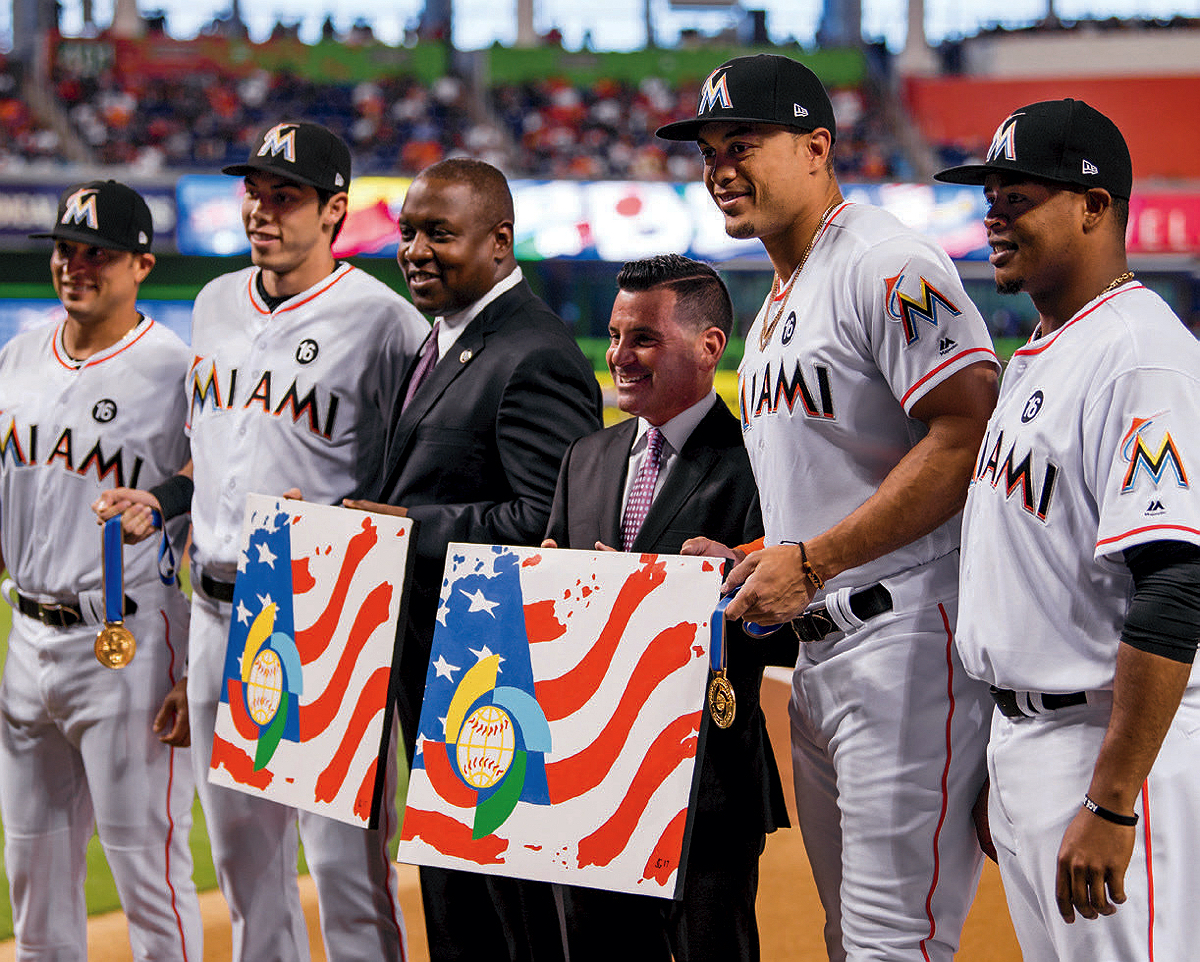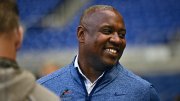In September 2016, a 4:30 A.M. phone call woke Michael Hill ’93, then general manager of baseball’s Miami Marlins, from a sound sleep. The team’s star pitcher, 24-year-old José Fernández, was dead. The young man was more than a player to Hill—the pair had forged a close mentorship. After drafting Fernández, Hill had sat in the pitcher’s living room, speaking in Spanish with his Cuban parents to persuade him to sign with the team. When Hill later gave him advice, Fernández would put his head on Hill’s shoulder. “It was like I lost a son,” says Hill.
By then, Hill had already spent more than a decade helping lead the low-budget Marlins. To succeed despite stingy ownership, he needed to get the most from his players and staff. That started by seeing them as people, not numbers; creating personal connections, not solely conducting business. Sometimes, that hurt.
Hill was able to connect with players because he is a sincere, multidimensional leader who transcends categories. He’s black and Latino, an Ivy Leaguer and a student-athlete, a minor league baseball player and a Major League Baseball (MLB) executive. Understanding all those perspectives helped Hill become a caring, thoughtful baseball insider. In 2021, after 25 years in MLB front offices (including seven as Marlins general manager, only the fifth black GM in the league’s century-plus history), he took his broad expertise leaguewide as senior vice president of on-field operations. There, he works to keep the sport engaging for a new generation of fans.
Throughout his career, the multi-sport Harvard athlete has made a point of forging working relationships with everyone. He can talk strategy with players in the locker room and then go up to the owner’s box to discuss the team’s financial outlook. Throughout his life, Hill has transcended such bounds.
Growing up in Cincinnati, Ohio, Hill remembers being one of two black players on his Little League team: the other was his cousin. The son of a Cuban mother (a warehouse worker) and a black father (a truck dispatcher), Hill has always felt more black than Latino. Still, he connected with his Cuban family by studying Spanish: he spoke the language with his grandparents and attended bilingual schools, developing a fluency that would serve him well in baseball. Throughout high school, he played football in the fall, basketball in the winter, and baseball in the spring. He hoped to attend a Big Ten university to play either baseball or basketball. But a junior-year transfer to a private school introduced Hill to the possibility of going to an Ivy League school, and his multi-sport athleticism shaped his college search. He figured those smaller programs would let him play both sports and help him “use athletics to take me as far as it could.”
At Harvard, he quickly thrived athletically. He was a four-year starting outfielder for the baseball team (and captain as a senior), and a three-year starting running back for the football team. Academically, the transition was a bit tougher. He remembers calling home during his first semester and getting a “strong pep talk” from his parents to push through a difficult math course. But he soon found his footing, concentrating in government and enjoying a mix of political science, sociology, and history courses.
“I could feel as comfortable speaking at a homeless shelter as I did speaking to the owner of the team....That comes from my time at Harvard.”
Hill credits Harvard with developing him into a leader, but not specifically on teams or in classes. Instead, he most values the wide-ranging “exposure to so many people.” He forged friendships through his teams, finals club, and concentration. This coalition of friends helped secure his election as a senior class marshal—and celebrated when he got the call on his Leverett Tower dorm room phone that he’d been picked by the Texas Rangers in the thirty-first round of the 1993 MLB draft right before graduation. He credits his diverse friends and contacts with preparing him to professionally serve as a conduit between players, coaches, and owners. “I could feel as comfortable speaking at a homeless shelter as I did speaking to the owner of the team,” he says. “That comes from my time at Harvard, and the networking and interpersonal skills that I developed.”
During his three years in the minors, Hill quickly rose as a leader. Teammates would ask him to help negotiate their apartment leases—not a facet of Harvard’s curriculum, but something they believed him qualified to do. The young Dominicans turned to him for help translating and adjusting to American life. Hill says some players even joked, “I’m going to be working for you one day.”
Though Hill says he was “just trying to be like everybody else and work my way up to the big leagues,” he constantly thought about his future beyond his playing days. The two-sport Harvard athlete chose baseball due to the potential for longevity. As an undergraduate, he imagined a Hall of Fame career before moving into a front-office position. So, when hamstring and shoulder injuries derailed his development, he focused on the latter half of that dream. He sought out executives and scouts before games, chatting and handing out resumes from a briefcase—an act more Ivy League than baseball player.
In the summer of 1995, he landed an assistant scouting job with the fledgling Tampa Bay Devil Rays, ending his playing career. Only the team’s fifth employee, he watched a franchise get built from nothing and learned to evaluate talent. “I played the game,” he says, “but I had to change my lens.”
In the fall of 2002, following four years with the Rays and three years directing the Colorado Rockies minor league system, Hill became the Marlins assistant general manager. Two decades later, he beams as he recalls the transactions and plays that led the team to a 2003 championship. “My first time in the playoffs,” he says, “I win a World Series.”
That championship Marlins squad seemed primed for long-term success. But baseball is cruel; Miami did not reach the playoffs again for 17 years. After the 2005 season, following two disappointing records, Hill had “to blow up the team.” Between trading some key players and allowing others to leave in free agency, he helped bring the payroll down from $60 million to $15 million—less than half of the next lowest team in the league. After the ownership promoted Hill to general manager in 2006 (and to president of baseball operations in 2013), they again compelled him to tear apart the team in 2012 and 2017.
Despite these repeated orders to destroy his team’s foundation, Hill did not grow frustrated. “I deal with the payroll I’m given,” he explains. “I knew the best way to get people in the stands was to put a productive team on the field….We had to make the best trades that we could.”

Under the employ of cost-conscious ownership, Hill’s Marlins rarely were good teams, but he takes satisfaction in the great players he helped find. “I’m proud of the fact that…I drafted and developed three MVPs with no money,” he says, referring to Miguel Cabrera, Giancarlo Stanton, and Christian Yelich. “I can’t even count how many All-Stars we had.” Despite the significant roster churn, he developed relationships with his players. “Our ability to connect with our players and our employees,” he says, was “how we overachieved.”
Another source of professional pride for Hill was his identity. As only the second Hispanic and fifth black general manager, Hill felt some extra pressure. “You know that you’re a role model, and everything you do is under a microscope,” he says. “You may not get afforded the same opportunities as others, because that’s just not how the game works.”
Despite the connection between him and his players, Hill says his Miami tenure ended coldly. In 2020, Hill guided the team through the COVID pandemic to its first playoff berth since 2003. At the end of the season, he met with the ownership group to negotiate his contract, which had just expired, and was offered a deal “which would have paid me like a first-year GM,” he says. Hill feared that accepting the contract would betray his fellow GMs, whose teams would see it as justification to cut salaries. He was disappointed that his commitment to the Marlins seemingly wasn’t reciprocated. “In the end,” he says, “the organization was comfortable letting me go”—and so he left.
The next year, he became MLB’s senior vice president of on-field operations, overseeing rules, umpiring, and discipline. He serves as a liaison between the league office and MLB teams. When he was a team executive, Hill felt that the league office struggled to articulate its vision for the game to its teams. Now, he is working to bridge that gap. “I filled a void at the league office,” says Hill. “I can speak to fellow GMs, I can speak to field managers, and they know that I’m coming from a place of understanding because I’ve done the job.” In Hill’s first three seasons with the league office, he has helped roll out new pace-of-play rules, cracked down on pitchers using illegal sticky substances to augment spin, and determined player suspensions for in-game transgressions.
Alongside on-field efforts, Hill helps lead MLB’s diversity initiatives. He has built education and outreach programs for women, minorities, college athletes, and mid-career professionals. But those efforts may not be enough to diversify top team positions. “GM and president are ownership hires,” says Hill, who is working on diversity programming for team owners. “Owners need to be comfortable with who they are giving control of this billion-dollar franchise to.”
Three years removed from running a team, Hill is happy with the slower pace of his life. In December, he remarried, adding two stepchildren to the three children from his first marriage. He spends most of his time at home in Parkland, Florida, occasionally traveling to the MLB office in New York City and to spring training, the All-Star Game, and the World Series. Moving forward, Hill wants to make sure baseball “is just the best version it can be…for my kids,” he says. “I love the game of baseball, and I love what it has done for me and my family. I won’t stop trying to make it better.”
Updated February 14, 2024: A prior version of this article misspelled the name of then-Marlins president David Samson.








